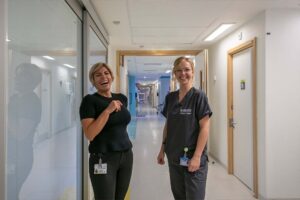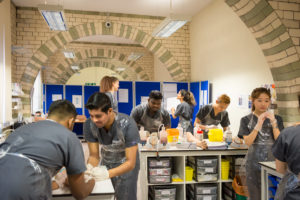How you'll learn
The blended learning delivery involves a mixture of on campus lectures, tutorial and workshops and online available resources. The student activities will accommodate the students’ working patterns and the international make-up of the cohorts.
Teaching activity involves a mixture of scheduled directed student hours, unscheduled directed student hours and self-directed learning. The majority of modules (MDSC400, MDSC401, MDSC404) are organised in blocks (usually three per module, about 20 hours in total per 30-credit module) of teaching that will take place on campus. Depending on students’ needs, one-to-one tutorials are organised weekly, in addition to the online discussion boards.
The unscheduled directed learning activity is related to the reading of key papers/guidelines which support the lectures. Students are expected to spend about 120 hours per 30-credit module on self-directed, independent learning. This should include reading around the subjects covered in the online lectures, contributions to the discussion boards, planning of their essays and research topics, and the enhancement of their skills in critical reading, critical thinking, online communication and evidence based clinical reasoning/decision making.
How you're assessed
To ensure that assessment supports the programme aims and the developing of skills at Level 7, a range of assessment methods are used with the purpose of enhancing the students’ learning experience, ensuring authenticity and increasing inclusivity.
To meet the educational aims of the programme, the assessment strategy uses a range of assessment methods to cover the learning objectives. All assessment tasks involve elements of critical commentary, appraisal, clinical reasoning, reflection and/or critical evaluation of the relevant clinical-based decision making.
The assessment methods include:
- Individual written assignments (essays) linked to clinical scenarios, protocols and guidelines
- Individual presentations (of topics to be later developed in essays)
- Research project: in a form of an article, conference poster, and poster presentation.
The majority of assessment tasks are centred on clinical scenarios focusing on the ethical assessment and decision-making. These link the assignments to the ethical theories that underpins the everyday clinical practice and decision making. Other assessment tasks are related to the review of practice in the students’ own workplace, based within the context of national guidelines and protocols, to challenge their current ethical understanding and knowledge of professional practice.
A key component of the Assessment for Learning approach is student engagement with the discussion board, allowing students to explore concepts, and clarify understanding and application of the theory in their own practice. Engagement with other students enables learning between students and the understanding of a wider range of challenges and strategies.
Personalised feedback, covering content and academic skills, is provided on every assessment, including assessments for learning. Students requiring extra support can discuss their learning needs with the module leader who can then direct them to additional resources.
Liverpool Hallmarks
We have a distinctive approach to education, the Liverpool Curriculum Framework, which focuses on research-connected teaching, active learning, and authentic assessment to ensure our students graduate as digitally fluent and confident global citizens.
The Liverpool Curriculum framework sets out our distinctive approach to education. Our teaching staff support our students to develop academic knowledge, skills, and understanding alongside our graduate attributes:
- Digital fluency
- Confidence
- Global citizenship
Our curriculum is characterised by the three Liverpool Hallmarks:
- Research-connected teaching
- Active learning
- Authentic assessment
All this is underpinned by our core value of inclusivity and commitment to providing a curriculum that is accessible to all students.









